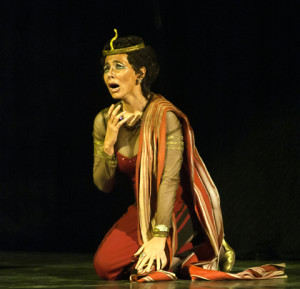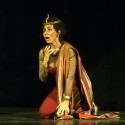Last week I attended a Boston Early Music Festival performance of Handel’s opera, Almira. The opera is rarely performed and, according to experts, has never previously been staged in the U.S. I didn’t know it when I purchased the ticket, but the opera is four hours long with two intermissions. I can’t ever remember sitting for four hours and having time fly by so quickly. It was absolutely delightful. The performers were magnificent. The sets, staging, costumes, and lighting were spectacular. It lived up to the reputation of opera as one of the most collaborative of all art forms.
Many of us think of opera only as singing, but that is a misunderstanding because it is a full theatrical achievement, and even the singing has style differences depending on the historical era and theme. As I sat near the top of the mezzanine of the Cutler Majestic Theater, the performers at first glance seemed like they were miles away; but when the opera began I was immediately drawn in and held captive by the spectacle. As I reflect on it now, I wonder why it was so impactful. It was, after all, written by a very young composer—Handel was only nineteen at the time—and there must be a reason it hasn’t previously been staged in this country. Yet, here it was in full scale production, and it is still fresh after 200 years because it deals with timeless and universal human emotions. Even the playfulness of the comical character, Tabarco, held emotional content that kept you engaged.
Opera performers are singers, actors, dancers, and linguists. Besides the high quality of the singing, these artists held my undivided attention through their acting, using every means of communication available—expressing their characters with body language and gestures that were honest and powerful. Actors communicate emotions—that’s what moves us.
Actors stir our passions and grab hold of our attention by moving authentically—
not pretending but being.
If you were to watch without sound, you would see the way they use their bodies in the expression of sadness or anger or lighthearted mischievousness. They literally create something real out of various movements, gestures and, along with the relevant singing and vocal nuance, connect you to an authentic human being. They use every means of communication in a congruent manner, commanding your affected response. You’re taken into the drama.
 Try this in your work, relationships, and everyday life.
Try this in your work, relationships, and everyday life.
[sws_checklist]
- Communicate with honesty, energy, and expressiveness—truly feeling what you try to convey.
- Pay attention—check to be sure your body language, gestures, words, and tone of voice match your intention when communicating.
- Practice and try again.
[/sws_checklist]
A commitment to this attentive process will help you communicate and connect to those you meet and work with in a meaningful way. We can be as impactful as an opera performer in our various roles in life by using every means at our disposal to express ourselves dynamically and authentically.
-Pat Hoy
